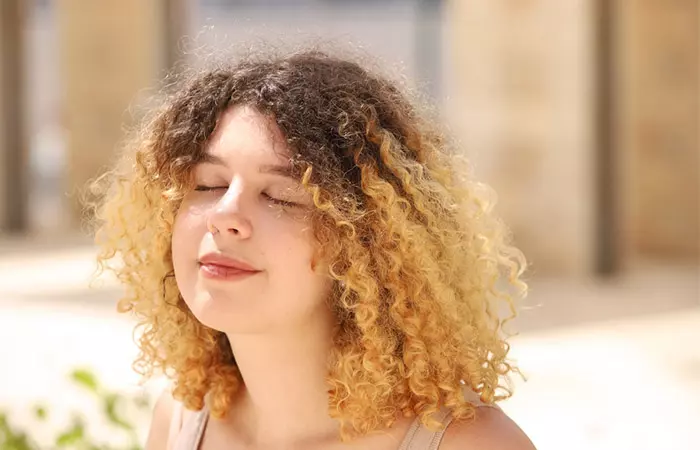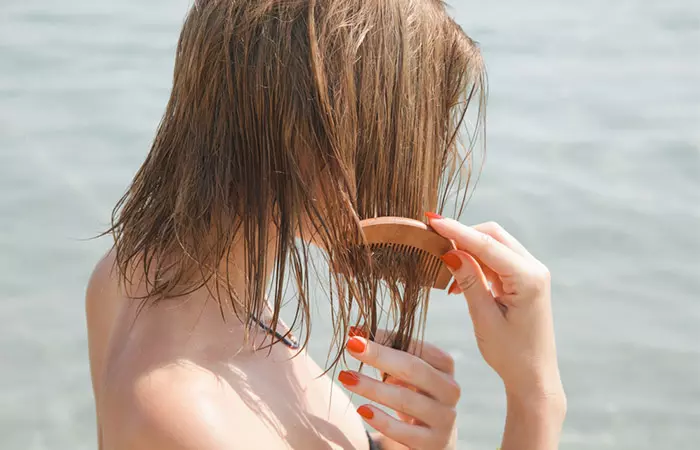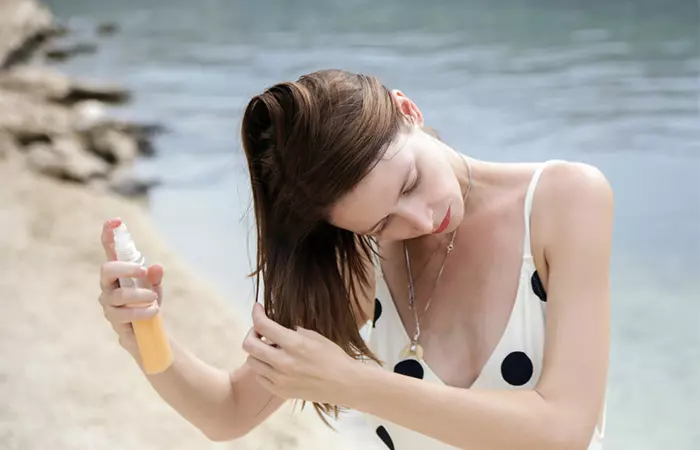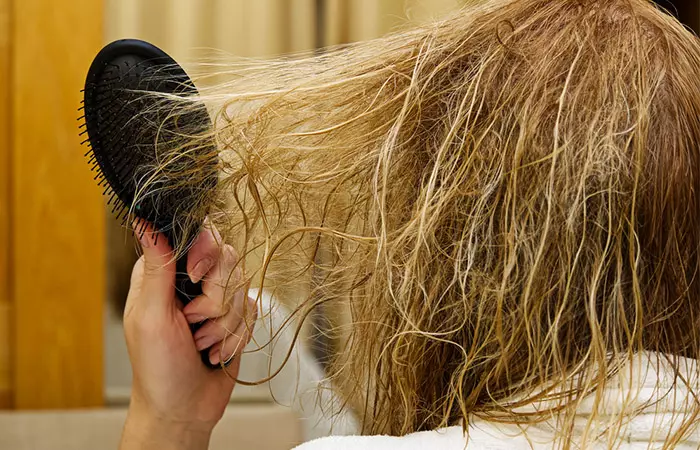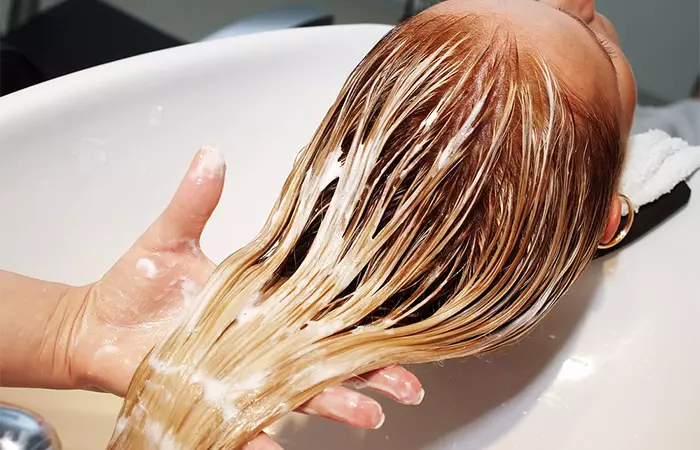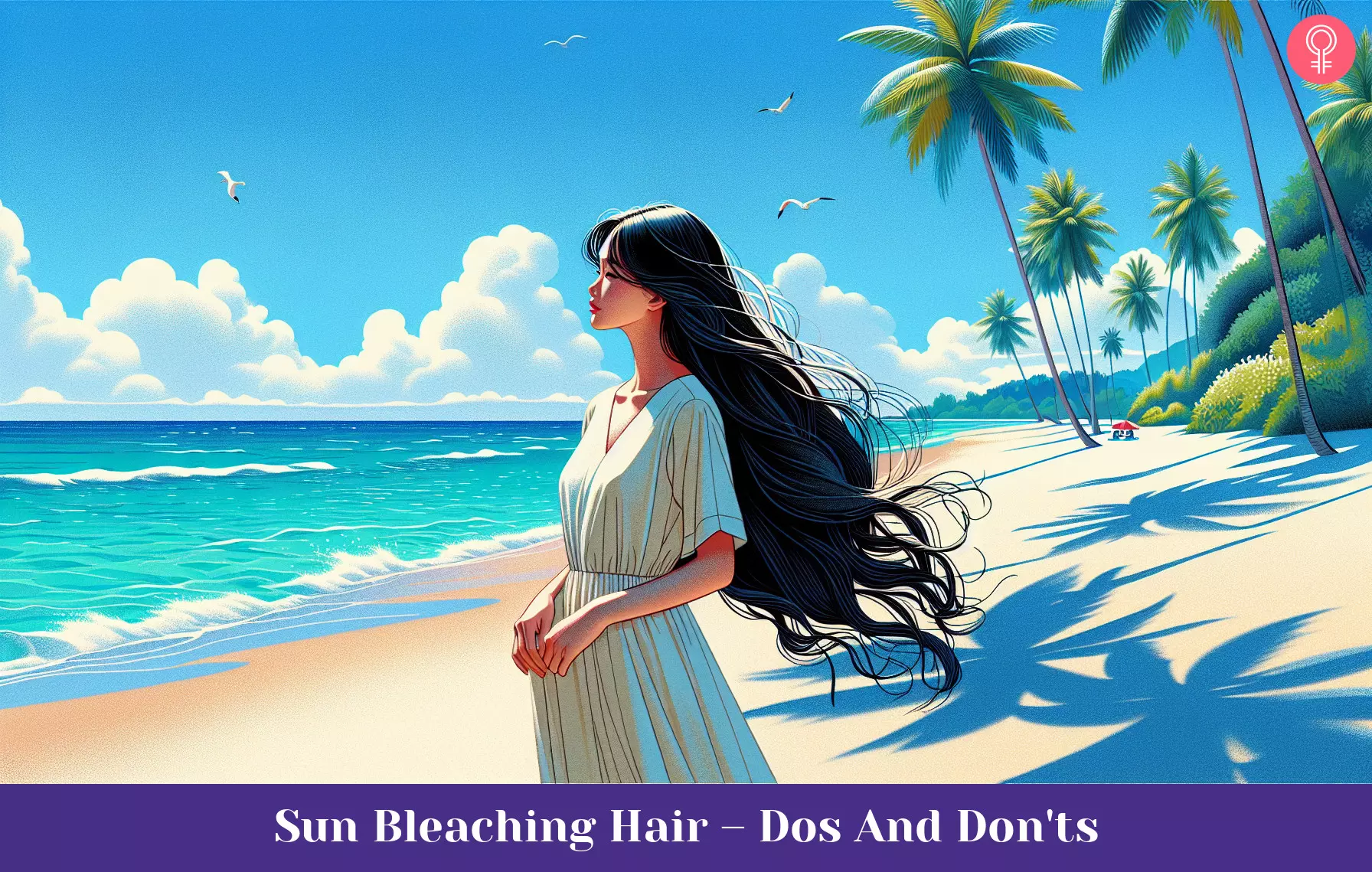Sun bleach alters the level of melanin, a natural pigment in your hair (and skin). The skin comprises living tissues, while hair only consists of dead ones. Hence, any changes in the melanin levels in your hair are permanent. It will not change until the hair grows out. Depending on your preferences, you can sun-bleach your hair to achieve semi-permanent lightened hair. This article outlines the benefits of sun bleaching, the steps to sun bleach your hair, the side effects of the process, and more. Keep reading to learn more.
Sun-Bleaching And Its Use In Hair Care
Have you ever hung your clothes to dry in the sun and noticed that they turned a lighter shade? This is called photodegradation or sun-bleaching. Sun-bleaching works similarly on hair, as well. Research has shown that the UV rays of the sun can change the color of hair, especially light-colored hair (1). Dr. John Kahen, MD, a hair transplant surgeon, says, “The sun bleaches hair by destroying the melanin in your hair, lightening it in the process. This can make the hair dead and remain bleached until new hair grows.” The most significant advantage of using the sun to bleach your hair is that you don’t need to spend money on expensive creams and serums. A simple lemon or a tea bag lying in your pantry would be of immense help in gaining that lighter shade in your hair. So if you wish to know how to lighten your hair without bleach, let’s learn about the latest and natural sun-bleach method below!
How To Do Sun-Bleaching On Your Hair
Given below are ways you can practice sun-bleaching your hair.
1. Lemon Juice
You can try lemon juice for hair lightening purposes. The acidic properties of lemon juice are well-known. The citric acid in it helps in breaking down the melanin in the hair. Lemon juice and UV rays work together to lighten your hair (2). Here are the steps to follow when using lemons to lighten your hair: Ella, a YouTuber, shared her experience of applying lemon juice to her hair and exposing it to sunlight for 30 minutes daily. She said, “You could tell there is a significant change in the color of my hair. I am so surprised at how light my hair was able to get with just a few days of some casual tanning outside. This was such a refreshing little change and for the cost of a couple of lemons, it really was nothing to me (i).”
2. Chamomile Tea
It is challenging to lighten dark brown hair without bleach and that is also through natural techniques. Chamomile tea can thus help in adding highlights to your dark hair (3):
3. Apple Cider Vinegar
Apple cider vinegar is another ingredient to opt for when going the natural route for bleaching hair. Other than bleaching your hair, it is also said to add luster and shine to dull and damaged hair. The acetic acid in it is claimed to help in keeping the scalp healthy, though there is no scientific evidence to prove the same.
4. Honey
Anecdotal evidence suggests honey is a great emollient as well as a bleaching agent. However, there is little to no research to back this up. Remember, the lightening effect may vary based on your hair’s natural color and how frequently you use the honey treatment. Here’s how to do it:
General Know-How For Sun-Bleaching Your Hair
Here are a few hair tips to remember when sun-bleaching your hair and to keep it protected afterward:
The citric acid in lemon helps in stripping the hair of color. However, if too much lemon juice is applied, followed by prolonged exposure to the sun, the cuticles of your hair stay open for longer. This can cause hair damage (1).
Lemon juice and apple cider vinegar are acidic in nature and quite potent. Ensure that you dilute them with water to prevent damage to your hair cuticles and scalp.
Wear a wide-brimmed hat to protect your sun-bleached hair from prolonged UV exposure. Apply a heat protectant spray to minimize damage and dryness. Condition your hair the previous day to lock in moisture. This will help minimize damage caused by acidic ingredients. Always rinse your hair with cool water afterward, as it help restore moisture.
Just like any other kind of bleaching, sun-bleaching too has its own share of side effects. Check them out below.
Adverse Effects Of Sun-Bleaching Your Hair
You can try sun-bleaching your hair if you want to change your hair color to a lighter tone or highlight your hair in sections. But, remember that sometimes sun-bleaching can be too much for your hair to handle. Excessive UV rays lead to the degradation of hair follicles and cause damage to the internal makeup of your hair (4). Sometimes, very healthy virgin hair color will not have any change in color at all because the cuticle shaft is so tightly bound that it doesn’t allow penetration. Moreover, sun-bleaching can harm the luster, softness, and overall health of your hair for a long time (5). You may need to use sun-protectant hair products regularly to restore your original hair health. Now, let’s check out how you can repair your sun-bleached hair.
How To Repair Sun-Bleached Hair
Sun-bleaching is usually done in summers when most of your outings are to the beach or the swimming pool. Too much salt or chlorine build-up causes damage to your already sun-bleached hair. Here are a couple of hair care tips to repair the damage:
Use an apple cider vinegar rinse to remove this buildup from your hair. Even regular shampooing helps in ridding your hair of salt and chlorine.
If sun-bleaching has damaged your hair too much, you can approach a hairstylist about re-coloring your hair to regain the lost color.
Sun-bleached hair is dry and needs moisture. You can use DIY moisturizing hair packs with ingredients like aloe vera, avocado, and coconut oil to restore your locks to their former glory.
Have enough hair protection precautions in place and practice sun-bleaching safely. Confused about whether or not sun-bleaching is a long process? Read on for clarity.
Is Sun-Bleaching Hair A Very Long Process?
Sun-bleaching has its advantages and disadvantages. You need to first apply lightening ingredients like lemon juice, chamomile tea, or apple cider vinegar to your hair. Then, you go out in the sun and let the UV rays work their magic (6). However, not all natural hair colors bleach at the same time. Blonde hair takes about 20 minutes of intense sunlight to lighten. In contrast, dark hair would need a minimum of 30 minutes before you can see any changes in hair tone. Similarly, fine hair will bleach faster than thick, coarse hair. Does everyone’s hair lighten in the sun? Check out the infographic below to bust some of the popular myths surrounding the sun bleaching process and learn the facts.Illustration: StyleCraze Design Team You may use simple ingredients like lemon or teabag to help with sun-bleaching hair treatment. Follow the steps and tips mentioned in the article to sun bleach your hair at home easily. Always do a patch test before trying a new ingredient to avoid any adverse effects. If your hair gets damaged due to sun bleaching, you may repair it by visiting a hairstylist or using the homemade remedies discussed above. With enough time in the sun, most people’s hair will lighten regardless of its color. Dr. Kahen adds, “But the amount of time needed in the sun before this happens varies greatly. Unlike our skin, which regenerates, our hair is dead and cannot make melanin. Therefore, once it is bleached, it cannot naturally return to its original color. The darker the hair color, the denser the pigment in the hair, making it more difficult to lighten in the sun. That’s why lighter hair often lightens easier in the sunlight.” Does sun lightening damage hair? Yes. Sun lightening can damage hair in the long run. This is because the sun rays constantly break down the proteins in your hair, turning it weak, dry, and brittle. Why does my hair look ginger in the sun? The oxygen in the air and the UV rays from the sun make the underlying warm tones in your hair pop out. Therefore your hair appears ginger or orange under the sun. Is the sun good for your hair? Yes. The sun is a good source of Vitamin D, which boosts follicles and promotes hair growth. So your hair will do good with a bit of the sun each day. However, remember not to overexpose it as too much of the sun can damage your hair. Does salt water lighten hair without sun? No. Salt water works in combination with the sun’s rays to lighten the hair. However, without taking protective measures against them, this combination can ruin the condition of your hair. Can I sun bleach my hair if I have dyed it before? Sun bleaching on previously dyed hair can cause uneven lightening or dryness. The sun may interact with the existing dye, leading to unpredictable results. It’s best to deep condition your hair before and after sun exposure to keep it healthy and consult a professional for advice.
Illustration: Sun Bleaching Hair – Dos And Don&039ts
Learn how to naturally lighten your hair with the help of the sun! Watch this video to learn how to safely and successfully bleach your hair naturally.
